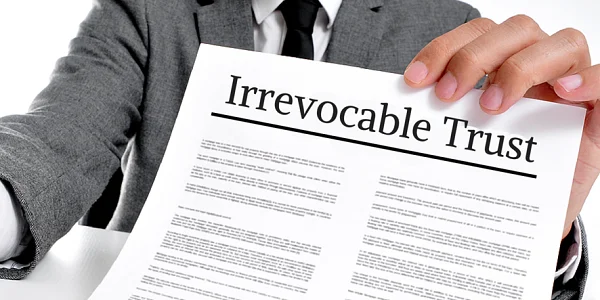
Irrevocable trusts are usually created to protect assets from lawsuits, reduce taxes and provide for an estate plan for heirs. The trust is considered separate from the person who creates it, called the “settlor” or “grantor.” So, when the settlor is sued and the trust is properly and timely established in the appropriate jurisdiction, the assets of the trust can be shielded from judgments against the settlor. The other parties include the “trustee,” who manages the trust, and the “beneficiaries” who receive the benefits of the trust set up.
Irrevocable Trust – Must be Drafted Properly
It is not simply a matter of adding the word “irrevocable” to a trust that magically turns it into an asset protection tool. The assets held inside of the irrevocable asset protection trust are shielded from the debts of the beneficiaries of the trust if those beneficiaries have a contingent, and not a defined interest in the trust. That is, they cannot scoop the funds out of the trust arbitrarily. If they could, so could their creditors. Their interest in the trust is subject to a future event or at the discretion of the trustee, as outlined in the terms of the trust. Alternatively, or simultaneously, the trust will often include a “spendthrift” provision that keeps judgment creditors from seizing trust assets and prevents beneficiaries from using trust assets for the payment of judgments against themselves.
Under these conditions, assets would only be made available to creditors if the assets were paid out of the trust to the beneficiaries, so that the assets became the personal property of the beneficiaries. So, when under legal duress, the trustee could simply pay bills for the beneficiary directly. As long as the assets remain inside of the trust, they are protected and the beneficiaries can they are protected the trust can keep providing support to the beneficiaries and keep trust assets away from creditors.
Revocability
As the name implies, an irrevocable trust cannot be readily changed or canceled. There is a legal theory such that whatever the judgment debtor could do, the judgment creditor could step into his or her shoes and do the same. So, the reason for irrevocability is that if the settlor could easily change the trust, a judge could order the settlor to change the beneficiary of the trust to the settlor’s legal enemy.
So, depending on the jurisdiction, changes may be made through the cooperation of the third-party trustee, but not directly by the settlor. The settlor gives up ownership rights of the assets he or she transfers into the trust, but in certain jurisdictions, gets to enjoy the benefits of them. There are also “revocable trusts,” which do let the settlor change or cancel the trust. Broadly speaking, revocable trust do not provide asset protection because the direct ability to change the trust means the court could order a change that would be to the detriment of the settlor.

Needs an Independent Trustee
In order to provide asset protection, the trustee must be a true third-party trustee. In order to provide asset protection for you, the trustee cannot be you, your spouse, your parents, grandparents or children. The trustee cannot be a controlled employee or an agent of yours. These people would be considered your alter ego by the courts. There are licensed trustees, banks and other organizations that can assume this role.

Why an Irrevocable Trust for Asset Protection?
As stated, an irrevocable trust is usually for legal protection, tax reduction and estate planning. Since the settlor no longer has ownership of the trust, the assets are no longer considered part of the settlor’s taxable estate. It can remove tax liabilities from income the assets might generate. Exact tax implications can vary state to state, but such benefits usually can’t be enjoyed if the settlor still owns the trust. Assets can include a number of items including cash, businesses, life insurance policies and investment assets.
The best part? Settlors can still earn a return on the investments on trust assets. In some jurisdictions, the settlor can still be the beneficiary of the trust and receive the benefits of and income from the trust.
A/B Trust
Estate tax reduction or elimination is another reason irrevocable trusts are used. For married couples of higher net worth, irrevocable trusts are often drafted so that the trust is divided into two parts upon the death of a settlor. This is often in the form of an “A/B” trust. So, when the settlor dies, half of the assets go into an “A” trust for the benefit of the surviving spouse. The other half goes into a “B” trust that remains in the estate of the deceased spouse.
The surviving spouse typically retains access to the full value of the “A” trust and the income produced by the “B” trust. Then when the second spouse dies, the “A” trust is given to the beneficiaries (usually the children of the settlors) as an inheritance from one spouse. The “B” trust is also granted as an inheritance to the beneficiaries from the other spouse.
Estate Laws
Depending on the estate tax laws at the time of death, the recipient gets to inherit a certain amount from each deceased parent estate tax free. So, the result of this arrangement is that the beneficiaries receive double the amount of the inheritance free of estate tax. This is because the A/B trust arranges for one inheritance from the estate of the last surviving spouse from the “A” trust and one inheritance from the estate of previously deceased spouse that had been held in the “B” trust.

The Three Parts of an Irrevocable Trust
As discussed above, irrevocable trusts require three parties—the settlor, trustee, and beneficiary. The settlor, a.k.a grantor, “grants” assets into the trust. When assets are placed in the trust, it’s officially a gift and cannot be taken back independent of the trustee. The grantor is in charge of setting up the original the rules, terms and uses of trust assets. Both the trustee and beneficiary must abide by the grantor’s wishes. Again, the trustee is the person in charge of managing the trust and carrying out the grantor’s wishes.
Technically, the trustee is also the “owner of the assets,” as guided by the terms of the trust. The trustee cannot inadvertently use trust assets for his own benefit unless the trust allows it. When the settlor transfers assets into an irrevocable trust, they’re really transferring ownership to the trustee (of which there can be more than one). Trustees have the legal title to assets, while beneficiaries have the equitable title. The settlor no longer has title to the assets. It’s a big step, particularly when a trust is irrevocable. One way to revoke such a trust, depending on the statutes and formulation of the trust, is if both the trustee(s) and beneficiary agrees.
What is an Estate?
A person’s estate is the net worth of that person at any moment in time, whether alive or dead. As such, it makes sense that protecting an estate and directing its distribution to heirs is paramount. Irrevocable trusts, properly established, can protect assets from even the most aggressive creditor. Irrevocable trusts can help optimize estate tax exemptions by reducing or eliminating an estate’s taxable assets. Irrevocable trusts can stop beneficiaries from misusing assets by distributing a portion of assets at specific ages.

Irrevocable Trust for Estate Planning
Want to see $300,000 disappear faster than you can say “David Copperfield?” Give it to a typical 15-year-old when the parents die. Having provisions in the trust that take care of living and educational expenses until the child reaches age 30, and the wisdom gained from age and education are more likely to lead to the preservation and growth of your hard-earned resources for subsequent generations. Assets can be kept in trusts under a variety of conditions as dictated by the settlor. That is why waiting until a beneficiary reaches a certain age before they can access the assets is a common irrevocable trust provision.
Although tax liabilities are removed from income earned by the assets, that doesn’t mean the assets stop earning income. Assets which earn income while held in the trust can still be enjoyed by the settlor (or beneficiary if that’s the wish of the settlor). The freedom to grant assets and/or remove assets from an estate while keeping the income they earn can be a huge benefit for a settlor.
Gifting
Financially savvy parents want to do more than leave their children an inheritance— ideally, they do so under favorable tax conditions. Gifting children a home (residence) via an irrevocable trust comes with better tax rules.
Putting a life insurance policy in an irrevocable trust separates any death proceeds from the estate, maximizing the payout to beneficiaries. Many times, beneficiaries of life insurance policies are spouses and/or children. An irrevocable trust, particularly when holding appreciating assets and life insurance policies, can be a key part of estate planning.

The Finer Details of Irrevocable Trusts
It’s no surprise that an irrevocable trust services a different purpose than a revocable trust. There might be asset protection, income and estate tax implications both now and in the future to consider. Like any estate planning, working with a reputable and professional is vital. Ultimately, irrevocable trusts can be a fantastic approach to gift-giving when coordinated among the settlor, trustee and beneficiaries. But like any “threesome” it takes proper planning and execution.
Not all settlors who set up irrevocable trusts have impressive amounts or value of assets. They are people who want to ensure their beneficiaries make the most of their inheritance—but that can be easier said than done. What if the beneficiaries don’t have strong financial literacy? If the settlor worries about the beneficiary being too young, inexperienced, or tempted to “blow the inheritance,” that is why so many irrevocable trust help protect both the assets and the well-being of the beneficiary.
According to the National Endowment for Financial Education, 70 percent of people who win the lottery or otherwise snag a windfall end up bankrupt or broke in just a few years. Settlors want to ensure their estate and assets, which they often worked hard their entire lives to build, are responsibly enjoyed by their loved ones. They want to be certain that the inheritance and legacy they leave are a help, not a burden.

How They Benefit the Settlor
Helping beneficiaries make the most of their inherited assets is a big part of an irrevocable trust, but not the only benefit. Choosing an irrevocable trust instead of simply “spending down assets” can be a much healthier approach. These trusts can also safeguard inheritances from sticky situations like divorces, or settlors who might want to make sure their grandchildren have college funds.
There’s no one size fits all form for setting up irrevocable trusts. Choose a specialist, preferably from an experienced organization (such as this one), who can form a trust which can be customized to individual needs. Once all assets are selected, from stocks to annuities, real estate to CDs, the next step is getting a tax ID number. The IRS assigns numbers which must be attached to the irrevocable trust. Finally, the assets are officially titled into the trust, and the settlor transfers ownership.
Are there any downsides to an irrevocable trust to protect assets? Loss of direct control of the assets can be thought to be one of them. However, if the trustee does not abide by your wishes, a simple change of trustees is all that is needed. The nice thing about an irrevocable trust, is the settlor gets to choose the terms of the trust, gets to choose the jurisdiction of the trust, gets to choose the trustee, and, with a properly drafted trust, gets to change the trustee, within certain asset protection parameters, if that person or organization does not follow his or her wishes.
Benefits
There are numerous benefits to irrevocable trusts compared to outright gifts. Without a legal tool, such as an irrevocable trust, dictating the terms asset transfer upon death, the deceased has little say in how or when beneficiaries receive and sometimes spend the inheritance. Although the trust can’t be revoked, the settlor can keep the right to change beneficiaries, through the aid of the trustee, as he or she wishes. In the proper jurisdiction, the settlor can also keep the income the trust produces. Those types of perks certainly aren’t built into an arrangement where “just” a gift is made.
Sometimes, settlors want to qualify for key benefits like Medicaid or Medicare. In order to qualify, a person’s asset must be below a certain threshold. So, a certain type of irrevocable trust is created, often referred to as a Medicaid Trust or Medicare Trust. Because the trust assets are truly separate from the settlor, once the assets have been in the trust and a five-year waiting period has elapsed, the previously held assets of the settlor are not counted against the recipient’s eligibility.

Irrevocable Trust Conclusion
Irrevocable trusts can work well to protect assets from lawsuits, cut taxes and manage an estate plan. The limitations on making unencumbered changes to the trust mean that the courts are also restricted from stepping into the shoes of the settlor or beneficiaries and making changes against their wishes. The settlor of the trust sets the framework by having the trust drafted according to his or her desires. The trustee’s job is to follow the instructions of the trust and to make sure that the settlor’s desires are carried out.
By J. Mehta



